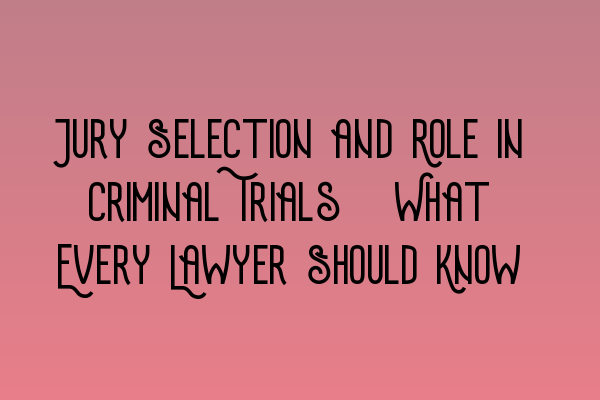Jury Selection and Role in Criminal Trials: What Every Lawyer Should Know
As a criminal lawyer, understanding the intricacies of jury selection and their role in criminal trials is
crucial.
A well-chosen jury can make a significant difference in the outcome of a trial, and it is essential to be aware
of the
key factors involved in this process.
The Importance of Jury Selection
Jury selection, also known as voir dire, is the process of selecting individuals from the pool of potential jurors
to serve on a trial. The goal is to assemble an impartial jury that will fairly evaluate the evidence and reach a
just decision.
The selection process involves questioning prospective jurors to determine any biases, prejudices, or prior
knowledge
that may impact their ability to be fair and impartial. It is essential for lawyers to carefully analyze potential
jurors and strategically exercise their peremptory challenges and challenges for cause to create the most
favorable
jury for their clients.
The Role of the Jury in Criminal Trials
Once a jury is selected, their role in a criminal trial is vital. In most criminal cases, the jury serves as the
trier
of fact. They are responsible for evaluating the evidence presented, determining the credibility of witnesses,
and
ultimately deciding the guilt or innocence of the defendant.
The jury must base their decision solely on the evidence presented in court and follow the instructions provided
by
the judge. They must set aside any personal biases or opinions and make an impartial determination based on the
law
and the facts presented during the trial.
Considerations in Jury Selection
When selecting a jury for a criminal trial, there are several important factors to consider. These factors should
guide
lawyers in their decision-making process to ensure they choose the most favorable jury for their clients.
1. Demographics: Lawyers must consider the demographics of the potential jurors, including age, gender,
occupation, and
socioeconomic background. These factors can play a significant role in how jurors perceive the evidence and
relate to
the parties involved in the trial.
2. Juror Bias: Identifying potential juror bias is crucial. Lawyers must ask specific questions during the
selection
process to uncover any potential biases or prejudices that may affect a juror’s ability to be impartial.
Understanding
the background and experiences of potential jurors can help identify biases that could impact a fair trial.
3. Jury Dynamics: It is also essential to consider the dynamics of the entire jury panel. How jurors interact with
one
another can influence the overall deliberation process. Lawyers should be attentive to potential conflicts or
alliances
among jurors that may impact the final verdict.
Conclusion
In a criminal trial, jury selection plays a critical role in influencing the outcome. A well-selected and
impartial
jury can provide defendants with a fair trial. It is crucial for lawyers to carefully analyze potential jurors,
uncover
biases, and strategically choose jurors who will best represent their clients’ interests.
Are you preparing for the SQE 1 exam? Check out our SQE 1 Practice Exam Questions and our
SQE 1 Practice Mocks FLK1 FLK2 to
enhance your
preparation. We also offer comprehensive SQE 2 Preparation Courses and SQE 1 Preparation Courses to help you excel in your
studies. Keep an eye on the SRA SQE Exam Dates to
stay updated on the examination schedule.
